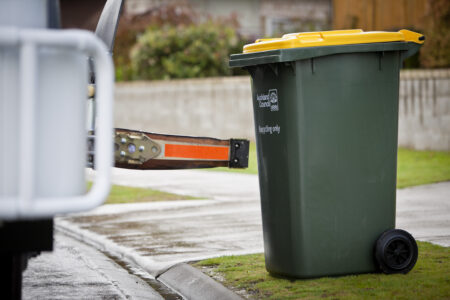
Auckland residents may need to brush up on their recycling etiquette as new national standards come into effect on February 1.
Everyone across the country is set to have identical guidelines for what items can and cannot be placed in kerbside recycling bins. Previously, it had depended on where you lived as to what items were accepted in local council collections.
Richard Hills, chair of the Planning, Environment and Parks Committee, is encouraging Aucklanders to familiarise themselves with the new recycling guidelines.
“By only putting in the right recyclable items into our bins, we are helping increase the quality of materials collected for recycling, which in turn reduces disposal costs,” said Hills.
“We want to protect our natural environment and recycle more resources back into the economy.
“Reducing the use of single use items is the best way to reduce waste, following that, it is recycling right. This change is another important step along the path to Auckland’s goal of zero waste by 2040.”
In 2023, Auckland Council updated its website and Binny smartphone app with what could and could not go into Auckland’s kerbside recycling bins in line with the Ministry for the Environment’s new national standards.
Items accepted in your kerbside recycling bin from February 1:
- Glass bottles and jars
- Paper and cardboard
- Plastic bottles, trays, and containers (grades 1, 2 and 5 only)
- Tin, steel and aluminium cans
New items excluded from February 1:
- Items less than 50mm (e.g. caps, small cosmetic and spice containers)
- Aerosol cans (steel and aluminium)
- Liquid paperboard (Tetrapak and juice boxes)
- Plastics 3, 4, 6 and 7
- Aluminium foil and trays
- All lids
- Items over 4 litres
Auckland Council collects about 132,000 tonnes every year from kerbside household recycling bins. The material collected is sorted and baled as paper, cardboard, aluminium cans, tin cans, glass, plastics (1, 2 and 5) and sent to facilities onshore and overseas for sale and reprocessing.
Recycling contamination still an issue for Auckland
Nearly a quarter of the material collected in Auckland’s kerbside recycling is contaminated with non-recyclable items like clothes, nappies and bagged rubbish. This contamination costs Auckland ratepayers an extra $3 million per year in sorting and disposal.
Materials that were never accepted in kerbside recycling, but which show up in Auckland bins include:
- Food
- Textiles, carpets and clothes
- Nappies, medical waste and garden waste
- Soft plastic and plastic bags
- Bagged recycling and rubbish
- Lithium-ion batteries and appliances.
Some of these items can be recycled through other means like Community Recycling Centres, private companies or, in the case of soft plastics, be returned to participating stores.
For more information on the new recycling guidelines, visit the Auckland Council website.
For anyone still unsure or needing to find an alternative method of disposal, search for a specific item to discover how to get rid of it using Auckland Council’s search tool or download the Binny app on Google Play or the App Store.










